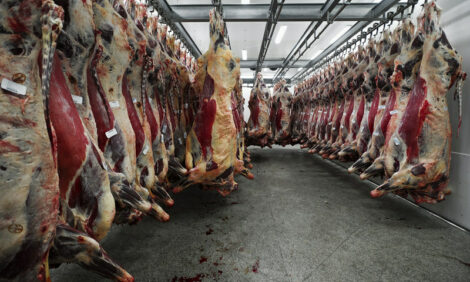



Market Prices for Livestock Continue to Stengthen
UK - Developments in the livestock markets of Scotland and the UK have been very positive over the past month with the hog trade showing particular improvement, according to the latest analysis by Quality Meat Scotland (QMS).While the price of hogs still languishes some 15 per cent below last year’s levels the trade has lifted some 10 -12 per cent over the past month, observed Stuart Ashworth, QMS Head of Economics Services.
“It is not just the UK that has seen this improvement. In Ireland hog prices have moved almost 5 per cent in the past month and likewise, although producer prices in France and Spain have fallen over the past month they have stabilised or improved marginally over the past week.
“Nevertheless, across the major sheep meat producing countries of Europe, lamb prices are around 15-20 per cent lower than last year for heavy, ‘UK-style’ lambs, and 5-10 per cent lower for the lightweight lambs typical of Mediterranean countries. The only exception is light lamb in Italy where the price is little changed,” said Mr Ashworth.
What is remarkable about the current trade in hogs in the UK and Ireland, he observed, is that the price improvement has occurred despite a significant increase in the volume of hogs reaching the market.
UK slaughter statistics reported an increased hog kill during January of 125,000 head, up some 13 per cent, which is a useful inroad into the expected increased carryover of more than 500,000 hogs.
“Throughput information from auction markets and price reporting abattoirs suggests that increase in kill seen in January may have increased further in February as current marketings are 25 to 30 per cent higher than last year,” added Mr Ashworth.
In Ireland, estimates of the volumes reaching export abattoirs show a cumulative increase of 30 per cent since the start of the year. Ireland recently published the results of its December census which reveals an increase in breeding ewe numbers of 2 per cent and a 7 per cent increase in other sheep which will include both slaughter and breeding hogs. However, the increase of 30 per cent in the hog kill in Ireland since the start of January suggests that this increased carryover of hogs in Ireland must be almost through the supply chain and Irish hog supplies will begin to fall back more in line with last year.
“However, such was the increase in estimated hog carryover in the UK that despite increased slaughterings the market will remain well supplied with hogs until the end of the season,” said Mr Ashworth.
“Increased supplies and increased prices, both in the UK and Ireland, implies better quality product and/or an improving consumer demand for lamb at home and/or across Europe. Price reporting abattoirs show that while the proportion of lambs grading R3L or better is lower than last year, it is higher than it was a month ago so lamb quality has improved recently.
Furthermore, latest retail market analysis from market research company Kantar shows substantial increases in sales of sheep meat in GB on the back of slightly lower retail prices. Meanwhile the retail price of beef, pig meat, poultry and fish are all higher than 12 months ago making sheep meat a more attractive option.
“Consumer demand for lamb in France, however, remains subdued and the retail price movement on lamb, while upwards, has not been as quick as the movement in pork or beef. That said, a more favourable exchange rate is making UK supplies more competitive,” said Mr Ashworth.
“While it is unlikely that hog prices will recover to the levels seen last year, the current mix of market conditions point towards the recent improvement in prices being sustainable.”
TheCattleSite News Desk


